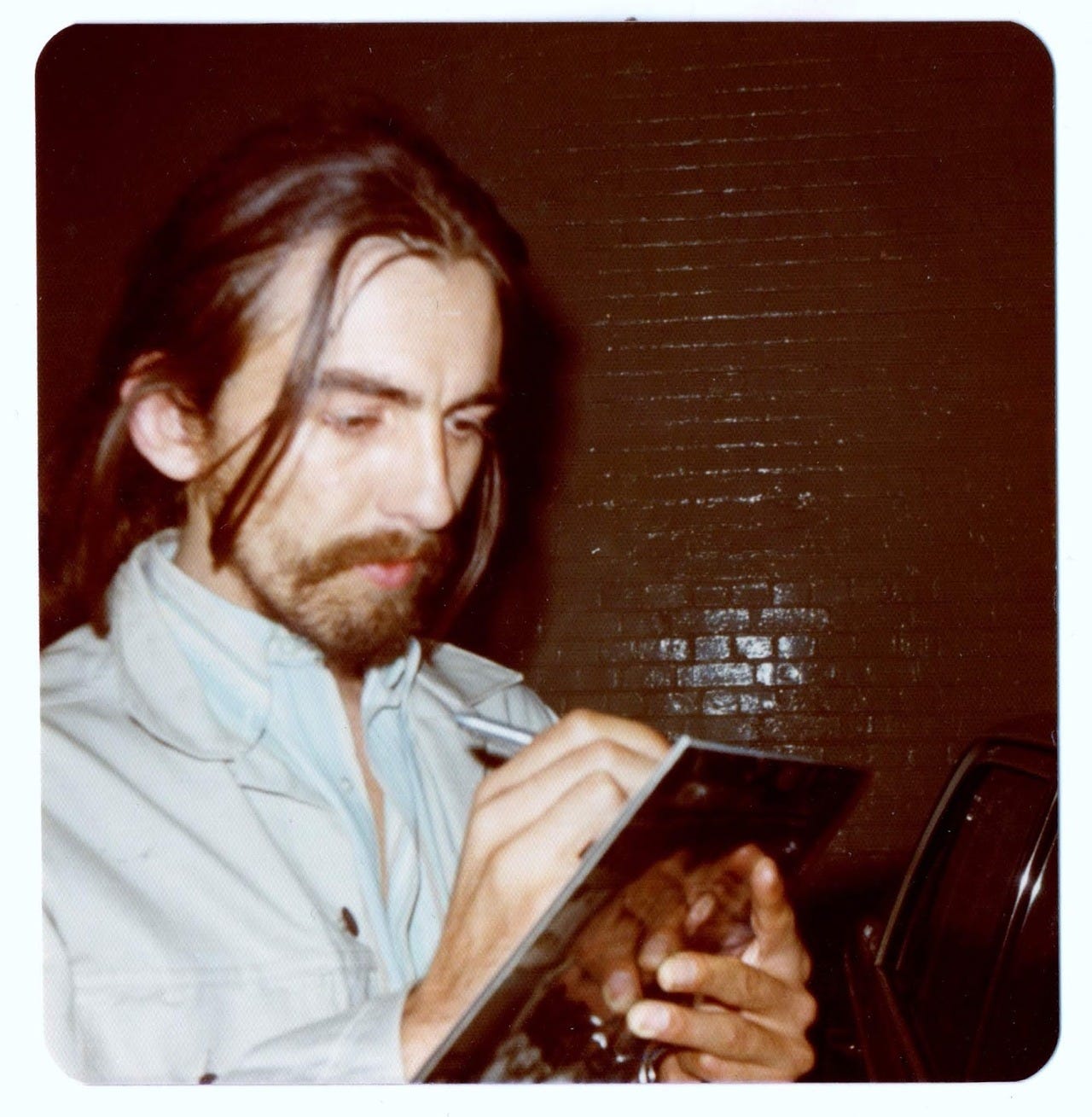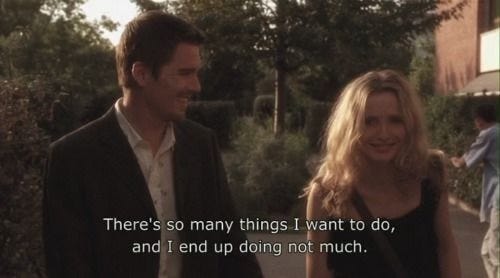George Harrison’s first solo album, “All Things Must Pass” was a triple album. He said after not having many tunes on The Beatles records, the writing process for this felt like “going to the bathroom and letting it out.”
No one likes to feel backed up…in plumbing, in texts, in unstarted ideas, in traffic, etc. It's an uncomfortable sensation, much like constipation. I’ve had several conversations recently with friends and in the Creative Clinic about this conundrum of having so much we want to do, post, learn, make, try, etc. that we end up doing not much…
We will have cycles where we feel backed up. It happened to Celine during Before Sunrise and to the “Quiet Beatle” during Beatlemania. Waiting to share until the right time, medium, or outlet reveals itself is a necessary, albeit frustrating part of the process
Like diarrhea isn’t the cure to constipation, emotional dumping or publishing an undercooked project isn’t the cure to procrastination. The most effective tool I’ve found that helps is to journal. It allows me to catch ideas while they have momentum, so my brain no longer has to hold them.
I didn’t grow up keeping a diary but for the last decade writing daily has been my most consistent habit. In 2012 I’d been a fixture in the self-help section of my hometown’s bookstore, buying book after book to solve my problems. One day I ventured into the stationery area to buy a colorful notebook that I would now call ugly.
Surprisingly writing on blank pages helped more than any of the gurus in the self-help department had. I had become a skilled social chameleon, but in the journal I was able to be fully honest, without attempting to be liked. It was so useful for me that I began telling others, prescribing prompts to pals.
Four years later, I was back in that store for a book signing when they stocked the book I wrote, in the self-help section. I had no idea how to help myself, much less others, but the topic of the book was: journaling. It never claimed to change readers, it just encouraged writing to access emotions and intuition and to collect ideas.
While I found it useful to brain-purge on a page in a format similar to Julia Cameron’s “morning pages” or what I called in an exercise in the book, “the morning dump,” I’ve learned since that it’s not the case for everyone.
Including one of my best friends, Stella, who hilariously points out that, unlike me, she’s not a big phone notes journaler:
“I’ve never been particularly inclined toward self-reflection. I lack the discipline to keep a diary, and my few feeble attempts have only served to make me self conscious. If I don’t have anything profound to say, why say it? I’ve also always nurtured a fear of spontaneously dying and having my most personal thoughts published posthumously, despite not being at any heightened risk for spontaneous death or being published alive, let alone dead.”
This was taken out of context from Fizzy Knickers which you should read in full—you’ll see that her brevity is another trait I admire and do not share. It’s one of the most moving posts I’ve read to date; in it she concisely tells a vulnerable story with humor and precision.
One thing I love about our friendship is that we have many commonalities and probably equally as many differences. I can only dream of the pace she flys through books, her impeccable style, and her eye for everything from interior design to films. And perhaps most of all, our differences like her take on journaling which is basically opposite to mine. Unlike Stella, the majority of my iPhone’s notes is my innermost thoughts hidden in a disorganized sea of empty “no additional text,” important codes, lists, and texts drafted but never sent.
I too would be mortified if someone found this now but, posthumously, I wouldn’t care: I’d be dead so they can know the truth.
The full truth, I think I’m good at concealing. But hiding takes energy, as Laurie Gerber said on the podcast in 2017, “What we lie about, we must manage.” Therefore, I’m honest more out of laziness than altruism. But often telling the full truth would take up too much space, so I try to read the room and opt to hold it in. Socially, it’s less lying, more leaving out, then letting out in iPhone Notes or notebooks—places with infinite capacity to hold the full version. It’s not my friend’s responsibility to listen to my verbal processing, and I never want them to feel like the Talking Heads lyric, "Go talk to your analyst, isn't that what they're paid for?"
But if I'm not externalizing experiences to others, I need to write to articulate them to myself. Unlike a friend or even a professional, journaling is free and has unlimited space to hold the details so my brain doesn’t have to. Not everyone is a verbal processor like I am, but what I have found to be somewhat universal is a need to express honestly in some way, eventually…
The problem with eventually… is that it is undefined or may never come. So capturing fresh feelings somewhere helps to prevent emotional or creative build up.
The longer I put something off for, the greater the anxiety to dive back in.
The longer I’ve gone without journaling the more I'll avoid writing to evade the overwhelm deeper self-awareness can bring. So for today’s list, I’m taking a stab at answering a question about this submitted here like my favorite newsletter, the iconic Red Hand Files.
Q: Hi, I have been following you since before you wrote your book. Can you give advice on how to fight resistance to journaling? I feel better when I do it but I can’t be consistent with it, what do you recommend?
-Kerrie
A:
Hi Kerrie!
Despite the above, I haven’t written in weeks…
I’m in a cycle where I know when I sit down to write my guts out, it may shift some emotional boulders that are holding up the house of cards allowing me to function. I avoid it because looking under the hood might open a Pandora's box of self-awareness that I don’t have the energy or resources to cope with, so I'd rather remain in blissful ignorance until I do.
What if there’s no need to “fight your resistance?” Perhaps it’s there to protect you from opening up a wound you’re not ready to see. Band-aid fixes get a bad rap but they are effective for keeping your guts (emotions) in until it’s safe to let them out.
I liken this to cleaning out a closet or a decluttering practice. The day you’re hosting a party is not the day to do a big decluttering, since it will get worse before it gets better. You don’t want to have shit all over with company coming over. Same with journaling; depending on the day, you may not want to have all your emotional clutter at the surface until you know you have carved out time to examine it and put it away. Our intuition knows this, so that’s a reason we don’t journal.
Alternatively, if you wait for the perfect journaling conditions too long, it could just be procrastination and therefore the band-aid must be ripped off.
I recently experienced major avoidance, not self-protection, with decluttering my actual closet. Professional organizer and decluttering expert Tracy McCubbins was the guest on this week’s episode.
Months ago she did a consultation of my space and advised that I invest in a dresser to organize my small clothing items and declutter my closet. I bought one, set it up, but it’s been sitting empty in the middle of my studio apartment for a month.
Why? Because I’m daunted by the idea of having to live within a deconstructed closet until I have the time or energy to put it back together. But that chaos was always there just hidden behind a door, so will having it visually exposed force me to complete it?
I’ve been waiting for a day when all my computer work is done, I've exercised, I have no social plans, and can luxuriate in the process of removing every item from my closet, deciding what to give away, and where to put what remains.
I will never have the amount of time I want to finish anything, but I do have the time I need to start, which is any time at all.
Same with journaling, sometimes writing some is better than none. Other times, starting to write without the emotional bandwidth for what comes up creates more stress than clarity. Only you can know if it is procrastination or self-protection, or…
A final reason I avoid writing is if it feels like it is lowering my mood. It’s a slippery slope between cathartic venting and full-on complaining. Even if I’m then making lists of how I could improve a negative situation, I’m still taking time away from doing items on that list, and that keeps me in the muck rather than pulling myself out.
To help determine where your resistance comes from today, I made you a teen Magazine-style quiz below.
QUIZ: IS YOUR RESISTANCE TO JOURNALING SELF-PROTECTION OR PROCRASTINATION?
Use this to help determine what type of resistance you’re dealing with at any given time.
START:
Clues: Go about your day and see if you get evidence. If you still get an idk from your intuition, continue… to step 2.
Logistics: Are you nervous about someone finding your writing? Y/N
If yes, how can we make that not an issue? e.g. a password
Looking under the hood:
Are you afraid you’ll be stuck having to face your issues if you’re honest with yourself, and then that self-awareness will fester in you until you do something about it?
Prompts:
What is it that you don’t want to look at, examine, or admit to yourself?
Why?
Set the stage: Depending on the size of the monster under the bed that you defined from the last step, you might need to gather some support, make some time to be able to open a potential Pandora's box of emotion. Even if it’s not that deep in there, the nature of it being unknown can be anxiety provoking.
So, ask yourself: do you have the time to process? Y/N
If no, save this for whenever you do. There’s no rush, this will be here. You’re all set. Have a nice day starting at step 5 another time when you’re ready!
If yes, can you create some extra space before diving in just in case? Continue to step 5.
Set yourself up for success: What do you need to do to set yourself up to be able to hold whatever comes up?
You know better than I do: If none of this resonated with you, what else do you think could be that’s potentially causing you to not want to do it?
Maybe that’s fine? Maybe you were just wanting to do it because people talk about The Artist’s Way a lot around you, and hot people at coffee shops and bars in your neighborhood seem to frequently be jotting notes in journals.
Do you just want to jot some notes and observations? And save the deeper processing for when you have more open space?
Depending on where you fell in here, if you do want to begin journaling, below are a few tips.
HOW TO START JOURNALING:
Since Let it Out came out in 2016, I’ve continued to talk about journaling, recommend it, made this video class in 2018, and teach workshops on it everywhere from Berlin to Kripalu. I was trying a lot of holistic shit back then so I’m just honestly so glad I picked a practice that is accessible, free, and I still find it effective. I taught a workshop recently in my neighborhood and Zoomed with a high school creative writing class in Florida who uses the book as part of their curriculum, which is a huge honor.
And during the peak of the pandemic I put everything I’d learned on the topic into a kit…called the Write Kit. Here are some tips from the first module:
Just start. Like with anything else, the more you do it the easier it will become.
It’s impossible to do it wrong. Not trying is literally the only way to fail at this.
Ask yourself good questions. Think of questions a therapist might ask or a friend talking through a difficult situation with you.
Don’t edit. We’re taught in English classes to analyze our words, not to mention spelling and grammar; however none of that matters here.
Be honest. If you’re not being fully honest with yourself on the page, it’s a waste of your time. If you’re writing for someone else or “in case someone sees” go write an email, that’s not journaling.
Play pretend. When doing anything new, it’s inevitable that, at least to some extent, you’ll feel like you’re pretending—at least I always do. But as Kurt Vonnegut says, “We are what we pretend to be.”
I hope this helps!
**
I’m proud that I’ve been sending these out nearly weekly, but I will be away next week so I’m taking it off. And after talking to Captain yesterday I decided we’re due for a lighter list… so the next one is fun… until then read some of my friends’. Or catch up on old issues.
One more thing!!

Starting today through the end of the week only (so until Friday March 8th), the WRITE kit is 50 percent off with code: write50. I’ve never done this much of a discount as it is quite robust but I’m happy to offer it now. I hope you take advantage of the discount if you’ve been wanting to WRITE.














